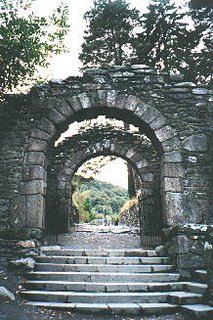
I remember one particularly thought-provoking reflective prayer time at bible college. We were asked to draw a squiggle on a piece of paper representing our life. We were to use the line to express the high points and the low points, then talk with a friend about the line and what the peaks/troughs represented. It was very helpful. We could see at a glance the places where we had most needed God or had felt most blessed. As helpful as this was, I began thinking today how restrictive lines are. We have our liberal/fundamentalist spectrum on a line; we all have to somehow fall somewhere in the spectrum. We have our "progress towards sanctification line", which becomes difficult to express when we mess things up. We have our "progression of history" timeline, which must be linear or we're all Buddhist. So naturally we  try to express our Christian life in linear terms. We read the 23rd Psalm and think of the Valley of Shadow of Death as a trough on a line. We read about pilgrimage (Ps 84:5-7) and the linear thought makes sense. But what if we read these verses and as well as the road we also saw the landscape. There is so much that goes on round about us that affect our vision of the road. It stops the road from being linear. There are so many dead end valleys we walk through, there are roads that criss- cross ours and though we believe we've followed the road we realise that something ahead of us looks awfully like the road
try to express our Christian life in linear terms. We read the 23rd Psalm and think of the Valley of Shadow of Death as a trough on a line. We read about pilgrimage (Ps 84:5-7) and the linear thought makes sense. But what if we read these verses and as well as the road we also saw the landscape. There is so much that goes on round about us that affect our vision of the road. It stops the road from being linear. There are so many dead end valleys we walk through, there are roads that criss- cross ours and though we believe we've followed the road we realise that something ahead of us looks awfully like the road we just travelled down, there are times when the landscape is urban, su
we just travelled down, there are times when the landscape is urban, su rrounded by people we don't know, focussed on a task we're uncertain of the value of, ... the valley of the shadow of death takes on new meaning then. There are times we are not just on a peak but we feel we are soaring above the landscape, grasped by the complexity of it yet also aware of the ease with which we are bypassing that complexity ... and there are the quiet waters ... i
rrounded by people we don't know, focussed on a task we're uncertain of the value of, ... the valley of the shadow of death takes on new meaning then. There are times we are not just on a peak but we feel we are soaring above the landscape, grasped by the complexity of it yet also aware of the ease with which we are bypassing that complexity ... and there are the quiet waters ... i nterestingly probably also a valley experience. As we consider the landscapes of life, we see a lot more than "need of God" and "blessing of God", peaks and troughs. Rather we see etchings, carved routes, landslides and erosion, we see much of what God has done to surround our lives with people, circumstances, landmarks and himself, sometimes to support or protect us as we make our messy choices and follow a messy route, and at other times to form us or guide us towards him, and towards his King
nterestingly probably also a valley experience. As we consider the landscapes of life, we see a lot more than "need of God" and "blessing of God", peaks and troughs. Rather we see etchings, carved routes, landslides and erosion, we see much of what God has done to surround our lives with people, circumstances, landmarks and himself, sometimes to support or protect us as we make our messy choices and follow a messy route, and at other times to form us or guide us towards him, and towards his King dom consummation. So not only does the landscape change, but we change, we are formed and moulded with the landscape. Of coure I am limited by human imagination so all I've done is taken the linear metaphor and replaced it with a 3D metaphor. Just a thought though.
dom consummation. So not only does the landscape change, but we change, we are formed and moulded with the landscape. Of coure I am limited by human imagination so all I've done is taken the linear metaphor and replaced it with a 3D metaphor. Just a thought though.
 try to express our Christian life in linear terms. We read the 23rd Psalm and think of the Valley of Shadow of Death as a trough on a line. We read about pilgrimage (Ps 84:5-7) and the linear thought makes sense. But what if we read these verses and as well as the road we also saw the landscape. There is so much that goes on round about us that affect our vision of the road. It stops the road from being linear. There are so many dead end valleys we walk through, there are roads that criss- cross ours and though we believe we've followed the road we realise that something ahead of us looks awfully like the road
try to express our Christian life in linear terms. We read the 23rd Psalm and think of the Valley of Shadow of Death as a trough on a line. We read about pilgrimage (Ps 84:5-7) and the linear thought makes sense. But what if we read these verses and as well as the road we also saw the landscape. There is so much that goes on round about us that affect our vision of the road. It stops the road from being linear. There are so many dead end valleys we walk through, there are roads that criss- cross ours and though we believe we've followed the road we realise that something ahead of us looks awfully like the road we just travelled down, there are times when the landscape is urban, su
we just travelled down, there are times when the landscape is urban, su rrounded by people we don't know, focussed on a task we're uncertain of the value of, ... the valley of the shadow of death takes on new meaning then. There are times we are not just on a peak but we feel we are soaring above the landscape, grasped by the complexity of it yet also aware of the ease with which we are bypassing that complexity ... and there are the quiet waters ... i
rrounded by people we don't know, focussed on a task we're uncertain of the value of, ... the valley of the shadow of death takes on new meaning then. There are times we are not just on a peak but we feel we are soaring above the landscape, grasped by the complexity of it yet also aware of the ease with which we are bypassing that complexity ... and there are the quiet waters ... i nterestingly probably also a valley experience. As we consider the landscapes of life, we see a lot more than "need of God" and "blessing of God", peaks and troughs. Rather we see etchings, carved routes, landslides and erosion, we see much of what God has done to surround our lives with people, circumstances, landmarks and himself, sometimes to support or protect us as we make our messy choices and follow a messy route, and at other times to form us or guide us towards him, and towards his King
nterestingly probably also a valley experience. As we consider the landscapes of life, we see a lot more than "need of God" and "blessing of God", peaks and troughs. Rather we see etchings, carved routes, landslides and erosion, we see much of what God has done to surround our lives with people, circumstances, landmarks and himself, sometimes to support or protect us as we make our messy choices and follow a messy route, and at other times to form us or guide us towards him, and towards his King dom consummation. So not only does the landscape change, but we change, we are formed and moulded with the landscape. Of coure I am limited by human imagination so all I've done is taken the linear metaphor and replaced it with a 3D metaphor. Just a thought though.
dom consummation. So not only does the landscape change, but we change, we are formed and moulded with the landscape. Of coure I am limited by human imagination so all I've done is taken the linear metaphor and replaced it with a 3D metaphor. Just a thought though.


